Q&A with Justin Welby: Trump, Brexit, China, colonialism, prayerPosted May 2, 2019 |
|
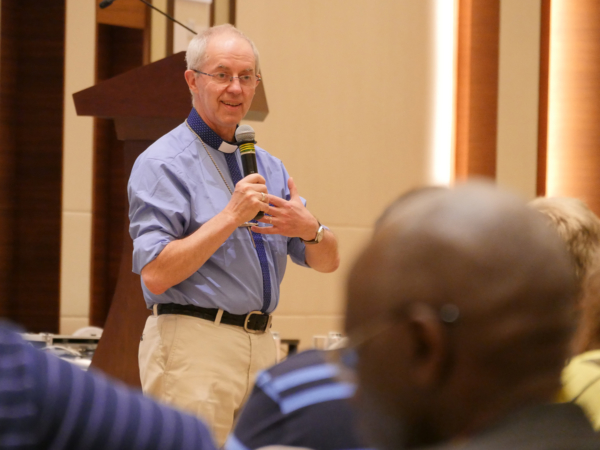
Archbishop of Canterbury Justin Welby spent about 70 minutes the evening of May 1, the fourth day of the Anglican Consultative Council meeting in Hong Kong, answering questions from ACC members and staff. Photo: Mary Frances Schjonberg/Episcopal News Service
[Episcopal News Service – Hong Kong] During an evening Q&A session here May 1, Archbishop of Canterbury Justin Welby gave his thoughts on a wide range of issues, including President Donald Trump, Brexit, the Anglican church’s colonial legacy, the efficacy of being a leader of the United Kingdom’s established church, the future of the church, his recent visit to China and his prayer life.
He also addressed his decision to exclude the same-sex spouses of bishops invited to the 2020 Lambeth Conference, the second time he has done so since arriving here for the 17th meeting of the Anglican Consultative Council. Episcopal News Service’s coverage of that part of the session is here.
The 70-minute session was on the record. However, reporters were prohibited from attributing questions to the askers. What follows is an edited collection of Welby’s replies to some of those questions.
Question: How can President Donald Trump enforce a harsh immigration policy and then go to St. John’s Lafayette Square, an Episcopal church near the White House, and “we welcome him as if nothing has happened?”
“I’m very careful about trespassing on other countries, but I think as Christians we have an absolute obligation to speak for justice, but we also have an obligation to speak for justice in a way that people can hear,” Welby said. “And that is much more complicated.”
Welby said he knows that often at St. John’s “the priests are very direct in their preaching because there’s been comment on it.”
“Jesus came to bring sinners to repentance and there’s not one of us that isn’t a sinner, all of us. I do things as the archbishop of Canterbury that I wake up in the middle of the night doubled up in pain at the thought that I did that thing because I’m so ashamed.”
“I don’t know President Trump at all. I know he’s the president of the United States of America and because I respect the United States of America, I respect the presidency. If I were to say anything [to him], which I will never have the opportunity to do, I would say it to his face, not behind his back.”

The Rev. Stephanie Spellers, canon to the presiding bishop for evangelism, reconciliation and stewardship of creation, and Presiding Bishop Michael Curry belt out the Lord’s Prayer in front of the White House on May 24, 2018. Photo: Lynette Wilson/Episcopal News Service
Welby said he knows that The Episcopal Church has spoken strongly and frequently about the administration’s policies. He was “hugely impressed” by Presiding Bishop Michael Curry’s participation in a vigil outside the White House in May 2018 just a few days after he preached at the royal wedding (where, Welby noted, Curry’s “incredible sermon” ran 13 minutes and 10 seconds, “which I understand is seven Curry minutes”).
Welby recalled an interview in which Curry said of Trump, “He’s my president and I pray for him every day.”
“That’s what I would say: pray, respect the office and be clear about the nature of what is justice. Let’s not descend into ad hominem, personalized attacks. I think that’s where it goes wrong because we demean them, but we don’t like to be demeaned ourselves. ”
Question: What are the advantages and disadvantages of being an established church? Do you see a time when the Church of England will be disestablished?
“I am not a politician, but I am enough of a politician to know that you never say never,” Welby said.
“What are the advantages? I think we would notice it if we weren’t established in terms of less ability to speak clearly in the public square. We do have a huge right to speak in the public square in the U.K.”
The disadvantage, he said, is “we have duties and obligations. We’re seen as the umbrella for all churches and all faiths. In other words, we’re expected to speak for those of faith, as well as those of Christian faith, and that’s sometimes complicated. It sometimes constrains us, but I think it constrains us very helpfully because it calls us to think very, very hard.”
“It’s not that it constrains us to be pro-government,” Welby said, noting that the bishops who sit in the House of Lords, of which he is one, tend to “vote three times against the government for every time they vote for it.”
“We are people through whom things are done. We educate a million children in state-run schools that are operated by the church under the local parish. I think the balance is that it’s good for us and I really think that it’s very good for the country because it says human beings are more than merely material. It says that the constitution recognizes that we are under God.
“The first thing that the queen did at her coronation in 1952 was walk straight past her throne up to the high altar of Westminster Abbey, kneel and pray silently. Then she went back to the throne, sat down and received homage from the political leaders of the country. She paid her homage to God, and then people paid homage to her.”
Question: Can you share with us your role and your vision about the indigenous church and the legacy of colonialism?
“There is a very long history of colonialism” in his family, Welby said, explaining that on his mother’s side, he was the first to be born in England rather than India since the end of the 18th century. He was raised by his grandmother, who was born in India in 1906 and who “shaped my vision,” he said. She favored India’s independence, and she told him she was the only English woman willing to nurse Indian troops with dysentery on the Burma Front during World War II.
[perfectpullquote align=”right” bordertop=”false” cite=”” link=”” color=”” class=”” size=””]Full ENS coverage of the 17th meeting of the Anglican Consultative Council is available here.[/perfectpullquote]
“I was brought up with this attitude that colonialism was bad, that although there were good people in the empire who sought to serve … the principle of imperialism, of colonialism, was deeply wicked. When you come to the Anglican Communion, it seems to me that we have to recognize that it is inherited from the colonial legacy,” Welby said.
“That is why I am so keen on saying we are a family of churches and the archbishop of Canterbury is the first among equals – among equals. I would hope that sooner rather than later it is possible for people outside the British Isles to be archbishop of Canterbury. It’s a long and complicated process and there’s no point in rushing these things. It’s very dangerous to do that.
“My vision is that, more and more, we become an effective, equal family of churches in which the imperial legacy is only history and a sad history at that.”
Question: What are your thoughts about Brexit?
“Is the press listening? Are you kidding me?” Welby began.
He is “ashamed” that he “didn’t listen well enough” and so assumed the vote would go the other way. “We didn’t listen carefully enough,” he said. “So, I’ve become much more cautious in trying to listen harder to the cries of pain from the poor and marginalized, and those shut out.”
“The vote has been taken and I think we have to listen to the vote,” but the issue of establishing a hard border between the Republic of Ireland, which was not part of the vote, and Northern Ireland, which was but did not favor exiting the European Union must be addressed.
“We have to have reconciliation … and that’s going to be unbelievably difficult. How as yet, I don’t think anyone knows. I sit in Parliament and I listen to MPs [members of Parliament] at all levels. I find members of Parliament in the most profound emotional distress. We’re asking them to make the most difficult decision that any British Parliament has had to make since probably during [the Great Labor Unrest of 1910-1914]. We need to pray for them and love them and support them because a lot of them are being pushed to the very of endurance.
“I’m not naïve [about the Ireland border issue], and I don’t see a way forward at the moment, but in a sense, it’s not my job. Our job is to be those who make peace.”
Question: What is your personal discipline of prayer?
“I got into trouble the last time I answered that,” Welby replied, referring to an interview he gave in January in which he said he prayed in tongues every day.
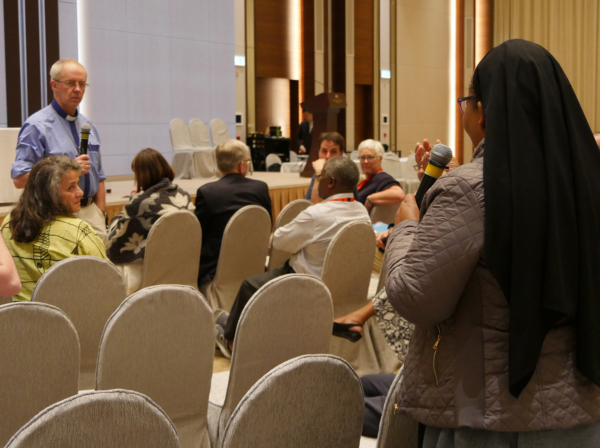
Sister Patricia Sibusisiwe, of the ACC-17 Chaplain Team and a member of the Community of the Holy Name in South Africa, asks Archbishop of Canterbury Justin Welby a question during the May 1 session. Photo: Mary Frances Schjonberg/Episcopal News Service
“I’m an early riser, and I spend it with Scriptures and in meditative prayer with the Scriptures. I work though the Bible steadily and systematically, always with an up-to-date commentary, often with one I disagree with because it really matters that it provokes you into thinking.”
“Then I go for a run and I use that for a very systematic time of intercession,” beginning with confession and then prayer for family, colleagues at Lambeth Palace, the Church of England, the upcoming Lambeth Conference, those who lead the congregations and diocese he used to lead, and the five people he has committed to pray for via the Thy Kingdom Come effort.
“I intersperse each section with praise because my spiritual director taught me to do that, expressions of love and praise for God.”
“And then finally I pray for myself. I spend time in between each section telling Jesus, ‘Thank you and I love you.’ And sometimes it goes well and sometimes it goes badly, but it’s what I do.”
He attends both Morning Prayer, daily Eucharist and Evening Prayer. He also tries to have 45 minutes of “silent prayer before the Sacrament” and often prays Compline.
“It’s pretty undramatic.”
“And I’m learning when I wake in the night, to pray.”
Question: Why did you visit the People’s Republic of China for a second time just before this ACC meeting?
“It’s 1.2 billion people. It’s very soon going to have the world’s largest economy. It’s rapidly becoming one of the world’s great military powers. It is a great civilization with profound intelligence within it and thoughtfulness and creativity, and a million other things that are good. Historically, it has only been for the last 150 years that it has not been the world’s greatest economy,” Welby said.
“It has a huge church. The official, registered Protestant church is about 35 million people, according to the [government] minister who I saw last week. The official Catholic Church is, I think about 20 [million people], and there are loads of arguments about the unregistered, the underground church, but from what I hear it could more or less double those figures.”
“Christianity is good for China. It brings stability. It brings harmony, peace, the love of those who are vulnerable, particularly the elderly. And Christianity has to have a Chinese face.”
The Christian church has grown since 1951 when the Protestant churches were officially combined and membership numbered about one million, Welby said. “And they’ve done that through difficulties and the Cultural Revolution [1966-76] and all kinds of things. We have so much to learn. They’re our sisters and brothers in Christ.”
“Don’t just leave it to the big international traders and commerce companies to be interested in China. Of all the dumb things to do, that is about the dumbest thing I can think of. We want to bless China.”
“Let’s work with Chinese Christians to exchange ideas. I think we have some things to contribute in terms of training for clergy and laity. … I think we could learn from them this passion for Christ in great simplicity. I think we learn from them how to be a blessing to the country you’re in. I’m utterly gripped and fascinated by that country.”
– The Rev. Mary Frances Schjonberg is the Episcopal News Service’s senior editor and reporter.

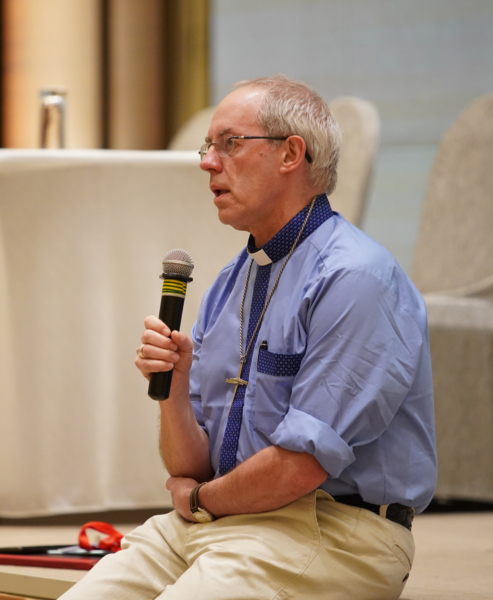
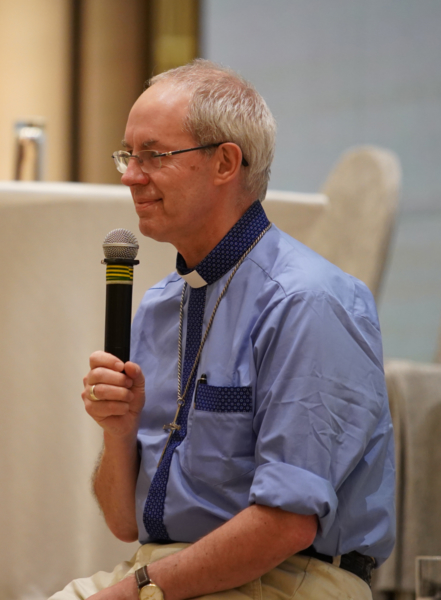
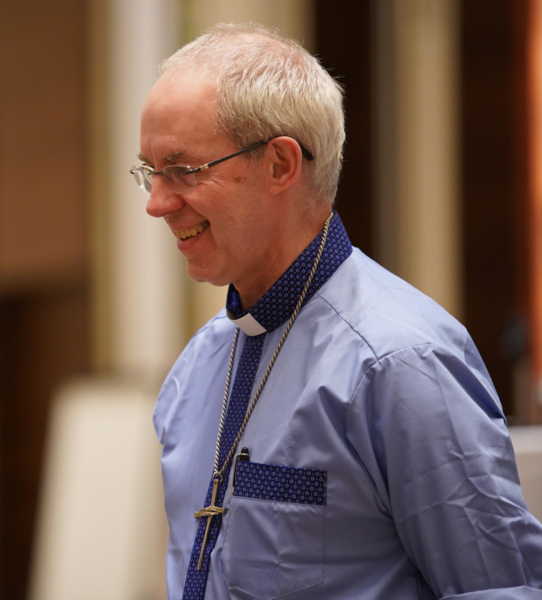
Social Menu